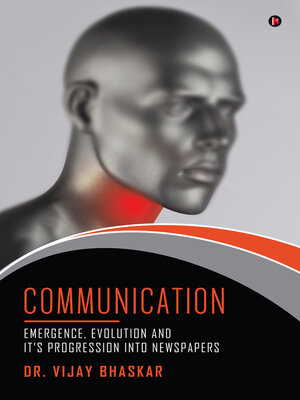
Sign up to save your library
With an OverDrive account, you can save your favorite libraries for at-a-glance information about availability. Find out more about OverDrive accounts.
Find this title in Libby, the library reading app by OverDrive.



Search for a digital library with this title
Title found at these libraries:
| Library Name | Distance |
|---|---|
| Loading... |
Humans are exclusively gifted by nature with some anatomical features that give humans an immense capacity to render complex speech. The book explores origin of speech right from the Hyoid bone that exalted human communication into a higher orbit, and then moves onto science and technology behind the development of communication, leading finally to the emergence of mass media, i.e., newspapers. It covers Gutenberg's marvelous machine which printed Martin Luther's Ninety-five Theses, the first voice of dissent in the world against the most powerful Catholic Church. 17th century natural philosopher Francis Bacon recognized three great technological innovations: the magnetic compass, the printing press and gunpowder as the distinguishing achievements of modern man. The present book discusses in detail one of the epoch-making inventions: the printing press and its natural progression into newspapers, its impact on societies of the world, its struggle to align itself against the worst of maneuvers to silence the press in the different time spans of history. The first Indian newspaper Hicky's Gazette by James Augustus Hicky in 1780 and from there a 200-year span has been covered in detail, which comprises the following chapters:
Role of science and technology in the development of recording information from oral matrix to printed matrix
Meteoric rise and mercurial fall of Hicky
British control over Indian newspapers, gagging of the Indian press and Vernacular Press Act
Role of Gandhi as a journalist
Role of Indian newspapers in the independence struggle, including the history of nationalist newspaper GHADAR: call of mutiny in India from abroad
Dubious Working of the East India Company
Monitoring of Indian publications in London
Emergency, when democracy was wounded







